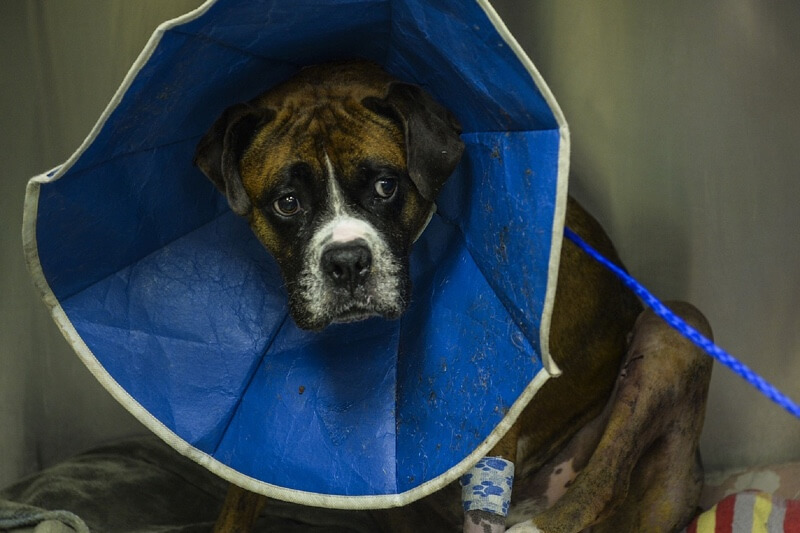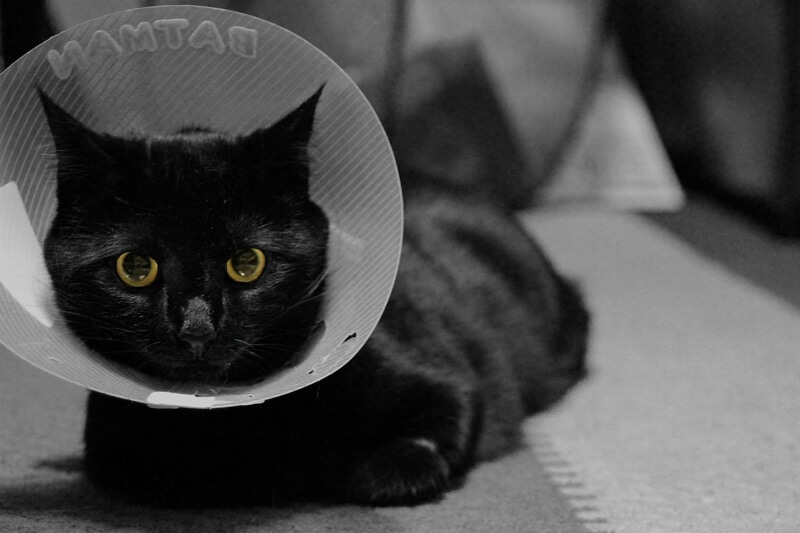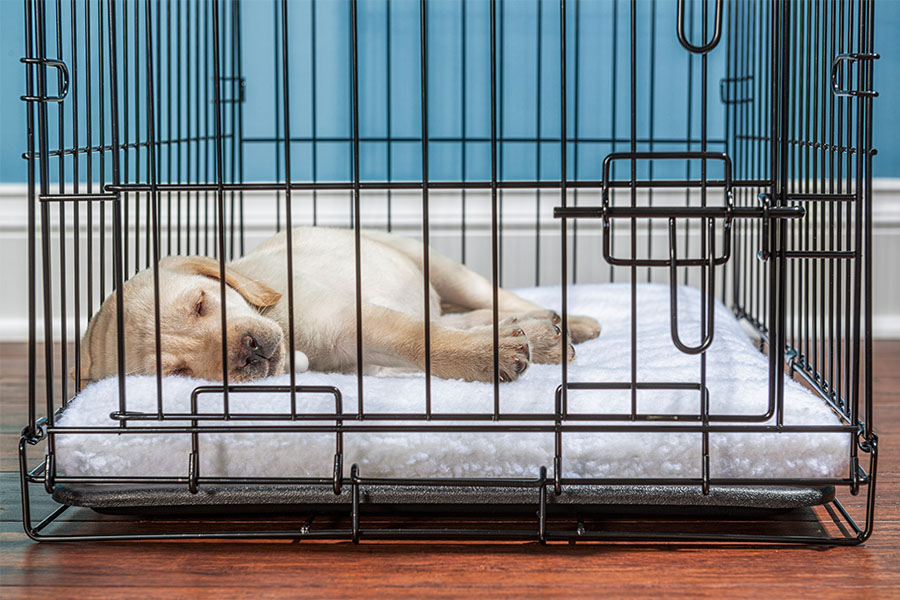
Puppies and kittens are energetic and curious little furballs who have a way of getting into trouble! They can also be prone to illnesses as they grow and mature. We looked over our claims data to see just what sorts of accidents and illnesses tend to more prevalent for our young pets. You’ll also find some common sense tips to help you care for your pet if any of these should occur.
A quick word of caution: Remember to be very careful handling sick or injured pets—for their safety as well as your own. They may be scared, anxious, and upset in addition to experiencing pain or discomfort. This can cause even the friendliest pets to try to run off, scratch, nip, bite, or otherwise act out. You should also do your best to remain calm, so you can think more clearly and better assist your pet.

Puppies
Do you have a little furball at home or maybe you’re thinking about bringing home a new puppy? It can be tough to keep them safe and healthy, as you’ll see from these common accident and illness claims.
Accident Claims
The top three accident claims for puppies are not all that surprising when you consider the typical temperament of these youngsters—rambunctious, reactive, and curious! The claims are 1) lacerations, 2) bite wounds, and 3) swallowed objects.
1. Lacerations
Puppies tend to act first and think later, which can help explain why lacerations top the list for accident claims. Lacerations can range from small cuts needing minimal treatment like a topical ointment and a bandage to more serious gashes that could require stitches, pain medication, and antibiotics to help prevent infection.
If your puppy suffers from a laceration, use a fresh towel or washcloth (a clean t-shirt will also do in a pinch) to apply gentle but firm pressure to the wound to stop any bleeding. Contact your veterinary office for further instructions.
2. Bite Wounds
Other puppies, dogs, kittens, cats, or wildlife that crosses a puppy’s path while walking or spending time outside can all pose a danger. Bite wounds usually have small punctures at the site, which can bleed depending on the depth and location of the bite. The area may also be red, swollen, and possibly bruised.
Bite wounds are at high risk for infection, and bite wounds from wild or unknown animals may pose a potential exposure to rabies. So, it’s a good idea to consult with your veterinarian about proper treatment. If you have any suspicion that the biter had rabies, you should get your puppy checked out immediately. It is also an important reason to ensure that your pet is up-to-date on their rabies vaccinations.

3. Swallowed Objects
Puppies love to chew on, taste, and mouth things, but sometimes this can lead to trouble if the object or a piece of it gets swallowed. Puppies have been known to swallow pieces of toys, rocks, small balls, hair ties, string, sticks, and plenty of other common household items.
You don’t need to panic if your puppy swallows something he or she shouldn’t, but you should seek medical advice. If the object is small and non-toxic, it may simply pass. Sharp or larger objects can cause injury to the digestive tract, and surgical removal may be required.
Illness Claims
The top claims for puppy illnesses are 1) ear infections, 2) stomach issues, 3) skin irritations, and 4) diarrhea. These health issues are common and can range in severity depending on the situation.
1. Ear Infections
Breeds with floppy ears, such as Cocker Spaniels or Beagles, may be more prone to ear infections than those with ears that stand up, like German Shepherds and French Bulldogs. Signs of an ear infection in puppies can include:
- Shaking the head
- Pawing at the ears
- Redness or inflammation around the ears
- Discharge from the ears
- Unusual odor from the ears
- Debris around the ears, which could indicate ear mites
Yeast or bacterial infections often cause ear infections that require treatment usually in the form of ear drops. Please avoid treating an ear infection without medical advice. Putting the wrong kind of medicine in your puppy’s ears could worsen the problem and even cause hearing loss.
2. Stomach Issues
Puppies are prone to stomach issues, which can range from mild discomfort to very painful cramping. They're digestive and immune systems are still developing and maturing, so they may not be as well equipped to handle problems as adult dogs.
A puppy with an upset stomach may experience bloating, vomiting, diarrhea, an inability to go the bathroom, or other symptoms. They can be brought on by a number of causes, such as eating something that didn’t agree with them or an allergic reaction to a food they haven’t tried before.
Stomach issues can also indicate other common dog diseases. Your veterinarian can help diagnose your puppy and recommend an appropriate treatment plan.

3. Skin Irritations
There are a number of common dog skin conditions and issues that can be causing your dog’s skin to become irritated, including flea bites, hot spots, infections, allergies, mange, mites, ringworm, or other parasites.
Talk with your veterinarian if your puppy is scratching uncontrollably, dragging his or her rump across the carpet, or has visibly red, inflamed, or irritated skin.
4. Diarrhea
Diarrhea in puppies is a common symptom of stomach issues and the fourth most common puppy illness claim on our list. It can have a number of causes and is probably worth at least a call to your veterinarian since it can make your puppy dehydrated. If diarrhea lasts a few days, is very liquid, or becomes bloody, you should seek medical assistance immediately.

Kittens
Kittens are simply the cutest purring bundles of joy ever! But they can be prone to some common accidents and illnesses. If you have a kitten at home or are considering bringing home a new kitten, you can watch out for these common ouchies and ailments.
Accident Claims
Like puppies, kittens seem to have a way of getting into trouble. According to our claims, they tend to suffer from these three accidents most often 1) back leg fractures, 2) bite wounds, and 3) swallowed objects. Interestingly enough, those last two are also on the top accident claim list for puppies.
1. Back Leg Fractures
Let’s face it—kittens don't always land on their feet! They’re new to all of that running around and leaping about, and may overestimate their abilities (“I can jump up on that high table—no problem!”) or not think ahead at all (“Wheee—here I go, down the stairs!”). These tendencies probably help explain the fact that back leg fractures sit atop the list of kitten injury claims.
If you notice your kitten limping or hobbling, you may want to get that leg checked out at the veterinarian’s office.

2. Bite Wounds
Even indoor only kitties can suffer from a bite wound from other pets in the house or an unwelcome rodent visitor. They can also get outside unexpectedly and have a run in with a cat, dog, or wild animal. It is critical that you ensure your kitten has been vaccinated against rabies.
Depending on the thickness of your kitten’s coat, it can be hard to detect a bite wound. If you suspect your kitten has gotten into a skirmish, it’s a good idea to check him or her over carefully for bite wounds and other injuries.
3. Swallowed Objects
It’s not surprising that swallowed objects come up second on the list of kitten accident claims. Kittens, like puppies, love to chew on things, especially when they’re teething. They also love to chase and capture “prey,” such as interactive toys or everyday household items, which can get ripped apart and swallowed or ingested whole.
String, rubber bands, and feathers can be especially dangers for cats to swallow. If your kitten ever swallows string, don’t try to pull it out, since you could injure the digestive tract. Always check with your veterinarian for advice.
Illness Claims
Young felines can be prone to a number of kitten illnesses and symptoms. The four we get claims for most often are 1) diarrhea, 2) conjunctivitis, 3) upper respiratory infections, and 4) parasites.
1. Diarrhea
What should you do if your kitten has diarrhea? As with puppies, it’s probably a good idea to all your veterinarian. Diarrhea can be mild and pass quickly, but it can also last for days and cause issues, like dehydration. Keep in mind that kittens and cats may hide or mask illness symptoms.
Diarrhea is one of the easier-to-notice signs your cat might be sick.
2. Conjunctivitis
Conjunctivitis is an eye infection usually caused by a virus, but can also occur after an injury like a scratch to the eye. Some people refer to it as “kitten pink eye” because it irritates the whites of the eyes making them look red or pink in color.
Conjunctivitis is typically treated with eye drops or ointments. It’s also contagious to other kittens or cats in the home. If you have more than one feline family member, you should keep the infected kitten separated from the other cats.

3. Upper Respiratory Infection
Kittens and cats are prone to upper respiratory infections, which take the third spot on our list. With a kitten upper respiratory infection, you may see signs like coughing, sneezing, runny nose or congestion, discharge from the eyes, and lethargy.
These infections are typically caused by viruses and can be spread to other kittens or cats in the home. However, these types of viruses usually don’t affect humans, so you don’t have to worry about catching it from your kitten.
4. Parasites
Kittens can contract many different types of parasites, such as mites, fleas, ticks, roundworms, hookworms, tapeworms, and heartworms. You may be surprised to hear that kittens and cats can get heartworms since it’s typically associated with dogs, so let our veterinary expert Dr. Mary Beth Leininger fill you in on the issue.
If you suspect your kitten has parasites, contact your veterinarian. Treatment will vary depending on the type of parasite and the severity of the situation. For example, you can often clear up ear mites by cleaning the ears and using drops. Something like roundworms or heartworms can get much more complicated and costly to treat.
Help make sure you’ll be able to give your little furball the best medical care possible by signing up for an ASPCA Pet Health Insurance plan. It’s great to sign up when your pet is young and healthy before anything happens! Get your free quote now.
Helpful resources for pet parents
Browse categories
-

Dog Spleens
The spleen is an unsuspecting organ—dogs can live healthy lives without them. Yet, these organs still have many jobs and can be the origin of health issues.
-

How to Crate Train a Puppy
Crate training your puppy has many benefits. Check out these tips to help make the process easier.
-

How to Care for a Female Dog
Are female dogs easier to train? What is a heat cycle? Does spaying change their personality? Here's what you need to know about caring for female dogs.

Browse Categories
(opens new window)
